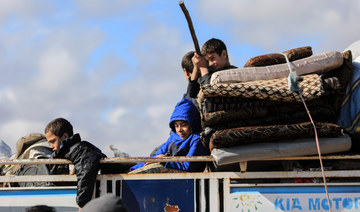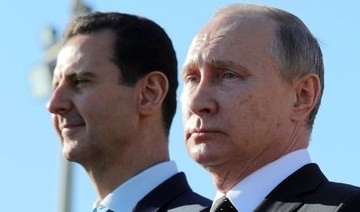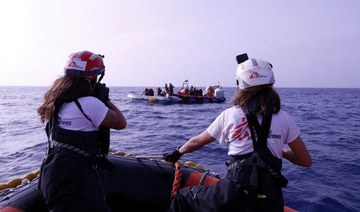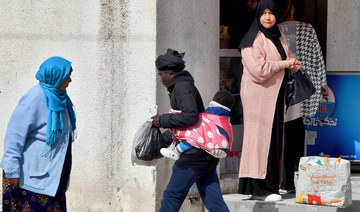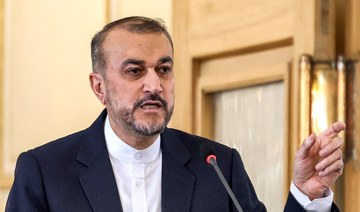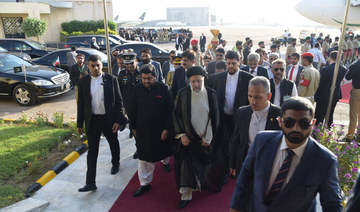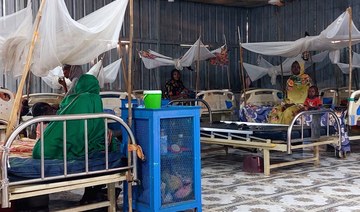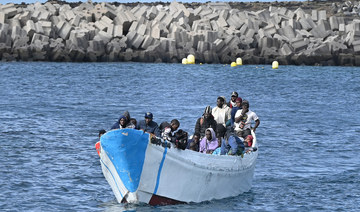UNITED NATIONS: More Syrians need humanitarian assistance now than at any time since the country’s civil war began in 2011, the UN’s deputy humanitarian chief said Friday, a sign that “the world is failing the Syrian people.”
Assistant Secretary-General Joyce Msuya told the UN Security Council that this week’s assessment of humanitarian needs found that 14.6 million Syrians will depend on assistance this year, a 9 percent increase from 2021 and a 32 percent increase from 2020.
“This cannot be our strategy,” she said, stressing that Syria now ranks among the 10 most food insecure countries globally, with 12 million people having limited or uncertain access to food.
Msuya said Syria’s economy is spiraling further downward, food costs keep rising, and people are going hungry. The cost of feeding a family of five with only basic items has almost doubled over the past year.
Families are now spending on average 50 percent more than they earn, which has meant borrowing money to get by, she said. This has forced “unbearable choices,” including pulling children, especially girls, out of school and increasing child marriages.
“Female-headed households, older persons without family support, persons with disabilities, and children are disproportionately impacted,” Msuya said.
She urged donors to respond generously to the UN’s upcoming humanitarian appeal for Syria for 2022, which will be geared toward ”increasing resilience” and access to basic services, including water.
“We need more funding and we need to scale up early recovery programing alongside our life-saving work,” Msuya said. “But most importantly, Syrians need peace.”
Geir O. Pedersen, the UN’s special envoy for Syria, told the council that militarily, “any of a number of flashpoints could ignite a broader conflagration.”
He cited as examples mutual shelling, skirmishes, and incidents involving improvised explosive devices across frontlines in the northwest, northeast and southwest as well as violence across international borders. There also have been drone strikes in the northeast, Israeli strikes in the south and in the capital Damascus, and security incidents on the Syrian-Jordanian border which the Jordanian government says are related to drug smuggling.
“It is plain that there is a stalemate, that there is acute suffering and that a political solution is the only way out,” Pedersen said.
He announced that a 45-member committee representing the Syrian government, the opposition and civil society will resume talks in Geneva on March 21 on draft constitutional reforms, and the co-chairs have agreed to future sessions in May and June.
Syria’s conflict that began in March 2011 has killed half a million people and displaced half the country’s pre-war population of 23 million, including more than 5 million refugees mostly in neighboring countries. Though fighting has subsided in recent months, there are still pockets controlled by the Syrian opposition, where millions of people live.
A 2012 road map to peace in Syria approved by representatives of the United Nations, Arab League, European Union, Turkey and all five permanent Security Council members calls for the drafting of a new constitution. It ends with UN-supervised elections with all Syrians, including members of the diaspora, eligible to participate. A Security Council resolution adopted in December 2015 unanimously endorsed the road map.
At a Russia-hosted Syrian peace conference in January 2018, an agreement was reached to form a 150-member committee to draft a new constitution. A smaller 45-member body would do the actual drafting, including 15 members each from the government, opposition and civil society. It took until September 2019 for the committee to be formed.
Pedersen said he is concerned that Russia’s invasion of Ukraine this week could make it more difficult to get the “international diplomacy” needed for a political process to implement the road map and bring peace to Syria, which is a close ally of Russia.
UN: More Syrians need aid now than at any time during war
https://arab.news/yfahw
UN: More Syrians need aid now than at any time during war

- Syria’s economy is spiraling further downward, food costs keep rising, and people are going hungry
- The cost of feeding a family of five with only basic items has almost doubled over the past year
Egypt’s foreign minister holds talks with director general of migration organization
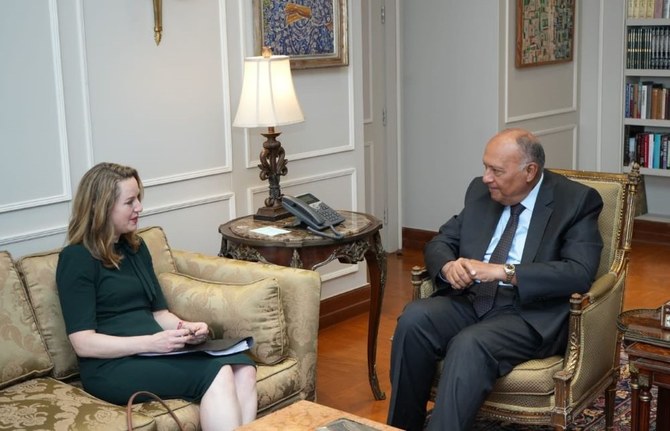
- Parties look at ways to support the Loss and Damage Fund
- Sameh Shoukry affirmed Egypt’s backing to adopt a comprehensive approach to migration governance
CAIRO: Egypt’s Minister of Foreign Affairs Sameh Shoukry held talks with the Director General of the International Organization for Migration Amy Pope during the UN official’s visit.
Shoukry expressed his appreciation of the organization’s cooperation, and spoke of aims to further relations to ensure comprehensive management of migration in a manner that contributed to achieving sustainable development in accordance with the principles and goals enshrined in the Global Compact for Migration. This stressed the importance of crystallizing the organization’s action priorities in consultation with developing countries’ governments.
He affirmed Egypt’s backing to adopt a comprehensive approach to migration governance so that it was not limited to security aspects only, but also took into account the development aspects associated with them, while addressing the root causes that lead to illegal immigration.
The minister also praised existing cooperation with the IOM in promoting ways of legal labor mobility and bridging the existing gaps in labor markets, thus achieving the interests of origin and destination states and migrants alike.
Shoukry noted that Egypt was facing increasing flows of migrants forced to flee their countries in pursuit of stability as a result of conflicts, economic reasons, or the repercussions of climate change, which had been clearly reflected in the sharp increase in the numbers of immigrants to Egypt.
He said that the support that Egypt receives from the international community was not commensurate with the burdens it bears to provide a decent life for those arriving, especially since the phenomenon had coincided with a period in which the Egyptian economy had suffered from the consequences of global crises, which had necessitated the organization to play its role in providing necessary support.
Pope thanked Egypt for its fruitful cooperation on issues involving the impact of climate change on migration, especially during Egypt’s presidency of COP27.
The parties also looked at ways to support and operationalize the Loss and Damage Fund and its important role in enhancing the ability of states to review the devastating effects of climate change and the impact on migration flows. They also spoke of cooperation between Egypt and the IOM in Africa.
Ministry of Foreign Affairs spokesperson Ahmed Abu Zeid said the meeting also looked at developments taking place in the region, with Shoukry and Pope discussing the situation in Gaza, and providing humanitarian aid and safe havens to shelter the displaced.
In connection with developments in Sudan, Pope spoke of her appreciation of Egypt’s reception of a large number of displaced Sudanese nationals since the beginning of the crisis, as well as the Egyptian authorities’ role in providing support to those fleeing the conflict, and meeting their needs.
The UN official expressed the IOM’s readiness to provide support for Egypt in order to enhance its ability to care for Sudanese refugees, in cooperation with the relevant ministries, noting that the organization attached importance to Sudan for fear of it turning into a forgotten crisis.
Sudan military downs drones targeting its HQ in Shendi, say army sources
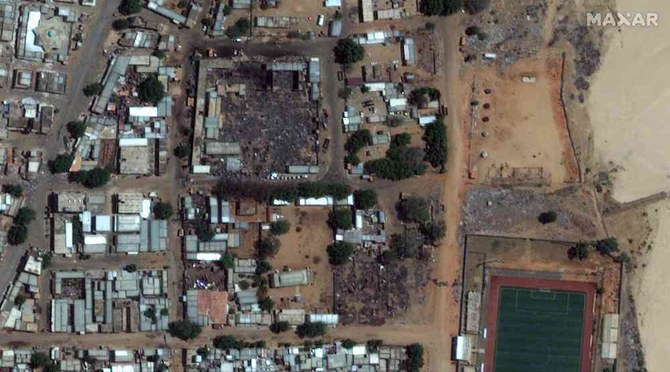
- None of the drones hit their target, the army sources said
- Sudan’s army is battling the paramilitary Rapid Support Forces for control of the vast north African country
CAIRO: Sudan’s army used anti-aircraft missiles on Tuesday to shoot down drones targeting its headquarters in the city of Shendi, witnesses and army sources said, the latest in a series of such drone attacks.
None of the drones hit their target, the army sources said. Reuters could not independently verify the report.
The head of Sudan’s army, General Abdel Fattah Al-Burhan, arrived on Monday in Shendi, which is some 180 km (112 miles) north of the capital Khartoum, army media reported earlier. It was not immediately clear whether he remains in the area.
Sudan’s army is battling the paramilitary Rapid Support Forces (RSF) for control of the vast north African country.
Tuesday’s drone attack is the third targeting areas that remain solidly under army control. The city of Atbara, also in River Nile state, and Al-Gedaref state to the east have also come under drone attack.
Both the army and the RSF have used drones in the conflict, which erupted a year ago.
The RSF, which controls much of Khartoum and western regions of the country, has not claimed responsibility for any of the attacks.
Shendi residents said the attacks have created panic in the town.
The war between the army and RSF has sparked warnings of famine, displaced millions, killed thousands in the crossfire and given way to ethnic killings by the RSF and allied militias.
The war appears likely to spread to the city of Al-Fashir, the army’s final holdout in the Darfur region, with many warning of a humanitarian catastrophe.
Iran threatens to annihilate Israel should it launch a major attack
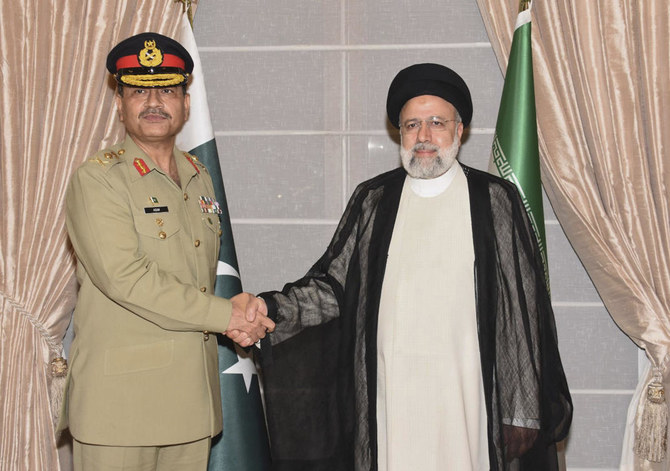
- Raisi began a three day visit to Pakistan on Monday
- "The Islamic Republic of Iran will honourably continue to support the Palestinian resistance," Raisi added
DUBAI: An Israeli attack on Iranian territory could radically change dynamics and result in there being nothing left of the "Zionist regime", Iran's President Ebrahim Raisi was quoted as saying on Tuesday by the official IRNA news agency.
Raisi began a three day visit to Pakistan on Monday and has vowed to boost trade between the neighbouring nations to $10 billion a year.
The two Muslim neighbours are seeking to mend ties after unprecedented tit-for-tat military strikes this year.
On Friday, explosions were heard over the Iranian city of Isfahan in what sources said was an Israeli attack, but Tehran played down the incident and said it had no plans for retaliation.
Iran launched a barrage of missiles and drones at Israel on April 13 in what it said was retaliation for Israel's suspected deadly strike on its embassy compound in Damascus on April 1, but almost all were shot down.
"The Islamic Republic of Iran will honourably continue to support the Palestinian resistance," Raisi added in the speech in Lahore.
Truce crumbles in Sudanese army’s last Darfur holdout
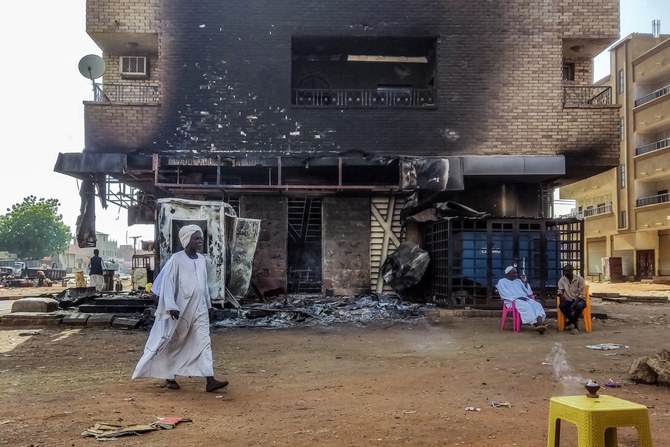
- Al-Fashir is the last major city in the vast, western Darfur region not under control of the paramilitary Rapid Support Forces (RSF)
- Witnesses say the army has reinforced supplies and troops, including through an air drop to its base in the city
CAIRO/DUBAI: Attacks around the Sudanese city of Al-Fashir have shattered a truce that protected it from a year-old war, leading to warnings of a new wave of inter-communal violence and humanitarian risks for 1.6 million residents crammed into the North Darfur capital.
Al-Fashir is the last major city in the vast, western Darfur region not under control of the paramilitary Rapid Support Forces (RSF). The RSF and its allies swept through four other Darfur state capitals last year, and were blamed for a campaign of ethnically driven killings against non-Arab groups and other abuses in West Darfur.
The fight for Al-Fashir, a historic center of power, could be more protracted, inflame ethnic tensions that surfaced in the early-2000s conflict in the region and reach across Sudan’s border with Chad, say residents, aid agencies and analysts.
Al-Fashir’s population includes an estimated half a million people displaced during that earlier conflict, when the army, assisted by Arab militias that evolved into the RSF, put down a rebellion by non-Arab rebel groups.
About half a million more people moved into the city during the war that broke out between the army and the RSF in the capital Khartoum in April 2023, as long-simmering tensions over integrating the two forces came to a head.
As the war spread to other parts of the country, local leaders brokered a truce in Al-Fashir, with the RSF confined to eastern areas of the city while the former rebel groups stayed neutral.
But the arrangement fell apart after the RSF took the town of Melit this month, effectively blockading Al-Fashir.
Witnesses say the army has reinforced supplies and troops, including through an air drop to its base in the city, unlike in other state capitals where soldiers quickly fled.
Two prominent former rebel groups, Minni Minawi’s Sudan Liberation Army (SLA) and Jibril Ibrahim’s Justice and Equality Movement, said they would also defend against the RSF.
Many non-Arabs in Al-Fashir are gripped with fear.
“We don’t know what to do,” 39-year-old resident Mohamed Gasim told Reuters by phone. “Al-Fashir is dangerous, but leaving is more dangerous.”
VILLAGES RAZED
Even before the truce collapsed, occasional skirmishes killed more than 220 people in Al-Fashir in the last year, according to Ismail Khareef, an activist in Abu Shouk, one of the displacement camps that dot the city.
Clashes on April 16 left at least 18 dead, Khareef said. Gunfire and projectiles, including from army warplanes, have fallen on homes, he and other residents say.
Since the start of the month, at least 11 villages on Al-Fashir’s outskirts have been razed, according to satellite imagery obtained by the Yale Humanitarian Research Lab. At least 36,000 have been displaced, the United Nations estimates.
Local activists and an SLA spokesperson blamed the RSF and allied militias, who have been known to use arson in past attacks, including in West Darfur. The activists said that survivors of the attacks reported around 10 people killed and that the attackers used ethnic insults.
The RSF denied attacking Al-Fashir and said it was careful to keep clashes away from civilians in the city, accusing the army and allied groups of attacking it on the outskirts. The RSF has previously denied responsibility for ethnic violence in Darfur.
The army did not immediately respond to requests for comment.
Al-Fashir itself has not had functioning running water or power lines for a year, said Awadalla Hamid, Darfur director for Practical Action, speaking to Reuters from the city, where few international humanitarians remain. Only one public hospital is functioning, while displaced people are crammed into schools and public buildings, he said.
Jerome Tubiana, an expert on Darfur and adviser to medical charity MSF, said all-out fighting “risks already complicating further humanitarian access, at a time where available data shows Al-Fashir is suffering of an extremely serious food crisis.”
SPILLOVER RISK
Since the war began, only small quantities of aid have entered Al-Fashir, the only army-approved conduit for shipments to other parts of Darfur. Residents say that though markets are functioning, the RSF’s control of the main road has caused prices for fuel, water and other goods to soar.
Recent tensions and violence around Al-Fashir have also raised concerns about a wider spillover.
The former rebel groups fighting alongside the army hail from the Zaghawa tribe, which reaches across the border into Chad, counting Chadian leader Mahamat Idriss Deby as a member.
Arab and non-Arab tribes like the Zaghawa have long clashed over land and valuable resources in Darfur, analysts say.
Complicating matters is the entrance of the forces belonging to Musa Hilal, a leading Arab commander from the early 2000s and rival of RSF commander Mohamed Hamdan Dagalo, known as Hemedti, despite hailing from the same tribe. A spokesperson confirmed a video of Hilal addressing forces in North Darfur on Monday, but said that it was too soon to say if the forces would join the fight in Al-Fashir or elsewhere.
“Even if there was a ceasefire between SAF and RSF this is way beyond them. There are scores being settled and tensions being renewed,” said Jonas Horner, an independent Sudan analyst.
Tunisian coast guard retrieves bodies of 19 migrants
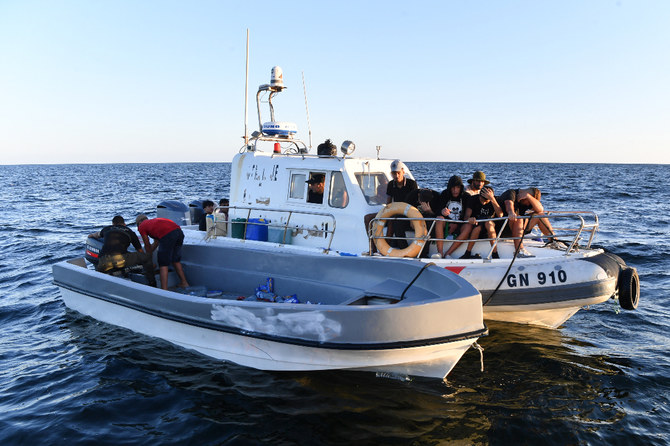
TUNIS, April 23 : The Tunisian coast guard has retrieved the bodies of 19 migrants who were trying to reach the Italian island of Lampedusa, the national guard said on Tuesday.
The latest incident took the number of migrant deaths off the Tunisian coast to nearly 200 in first four months of this year.



